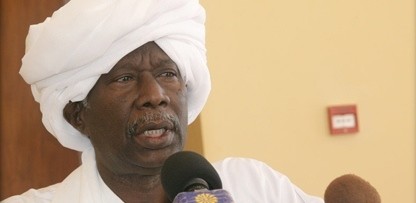The Sudanese co-chair for the disputed Abyei region received foreign envoys at his home Thursday, telling Radio Tamazuj afterwards that he was optimistic about upcoming talks with his southern counterpart. The official reiterated, however, that the government rejected the recent proposal of African diplomats.
“On our side we are optimistic to soon reach a solution to the Abyei issues,” said al-Khair al-Fahim, co-chair of the Abyei Joint Oversight Committee, pointing to upcoming meetings of the joint committee. “We are ready for the meetings of the oversight committee,” he said.
The other co-chair on the committee, Luka Biong Deng, told Radio Tamazuj that he is likewise prepared for the talks, noting also that he informed Sudanese Ambassador Mutrif Saddig that nothing should prevent a presidential summit in Juba. “We are willing to receive president Bashir in Juba for a joint meeting with Kiir,” he said on Wednesday.
In an interview, al-Khair acknowledged that the American and Russian special envoys visited him Thursday to discuss diplomatic efforts to overcome the Abyei impasse, which will reach a critical moment within days when the African Union’s deadline for the talks passes.
The deadline was set by the pan-African body’s security council in a resolution 24 October, giving the two sides six weeks for talks until the security council of the United Nations meets to endorse the AU proposal next week. The proposal would exclude Misseriya nomads from voting in a referendum in October 2013 but allow them seasonal access for grazing.
Politics of the AU proposal
Amid reports of the president’s ailing health, al-Khair al-Fahim met Bashir’s deputy Ali Osman Taha in October at the republican palace to review the council’s proposal, which the government ended up rejecting.
Taha, architect of the 2004 Abyei Protocol, would be a critical force behind any compromise deal. But even he is known to have opposed exclusion of the Misseriya from the referendum. And according to al-Khair, the protocol signed by Taha in 2004, now part of Sudan’s constitution, and the 2009 Abyei Referendum Act, are incompatible with the proposal of the African Union diplomats.
The proposal was crafted by chief mediator Thabo Mbeki and his team, known as the African Union High Implementation Panel. It has the backing of the US special envoy, Princeton Lyman, who has called the proposal “genius” because it “almost makes the referendum irrelevant” by conferring political and economic rights on both Dinka and Misseriya communities regardless of the outcome of the poll.
The Mbeki proposal is unacceptable to the regime, however, because it would violate the constitution and law, said al-Khair. The official, while uncompromising on this point, nonetheless sounded more measured than his fellow tribesman Mahdi Babo Nimir, head of the Misseriya popular committee, who last Wednesday lashed out at foreign involvement in Abyei calling the Mbeki proposal “Zionist, French, British and American.”
In question is whether opponents of the referendum, both at the tribal level and in some quarters of the regime, will be able to obstruct the government’s accommodation of foreign intervention. Al-Khair noted that the government last month agreed to renew the mandate of UN peacekeepers in Abyei. “We consider [the renewal] a very important agreement because it helps in maintaining the Abyei security conditions,” he said.
In terms of the 4,000-man peacekeeping force and the diplomatic process more generally, the regime has engaged with the foreign powers while avoiding a final determination the Abyei area’s status. The Misseriya popular committee and others, however, are agitating against a self-determination vote by the Dinka Ngok alone.
While dissent in the north puts into question the political feasibility of a deal, the current impasse is also diplomatically untenable, according to Dr. Luka Biong. The referendum, originally scheduled for 9 January 2011 at the latest, cannot continue to be delayed over the Misseriya question. “They have only two options,” the SPLM official told Radio Tamazuj.
The first option is to reach a bilateral deal before the looming end of the six-week period for talks; the second is to let the UN Security Council endorse the African Union proposal, said Biong.
UN Security Council intervention
Should talks in the coming days fail, the matter will come before the UN Security Council. “The deadline established by the AU PSC [security council] is now approaching,” said Francis Deng, South Sudan’s ambassador to the UN, in a statement issued from New York.
“The Republic of South Sudan would also welcome, the endorsement of the UN Security Council of any decision made by the African Union with regards to Abyei,” the ambassador stated Wednesday, arguing that the decision would not be an “imposition” on Khartoum but rather an endorsement of the African Union’s “considered view” of the way forward.
In Khartoum, meanwhile, diplomats have discussed with al-Khair al-Fahim setting up of the Abyei area administration, in which the position of assembly speaker was recently conceded to the north. The American envoy reportedly informed al-Khair that the US government has pledged $4 million in support for the Abyei local government and joint committee.
Most of the permanent population of Dinka Ngok fled Abyei in 2011 when the area was put under temporary military rule. For the most part villagers have not yet returned. Misseriya nomads have moved herds back into the area already this season, and Ethiopian soldiers are tasked with preventing clashes.
The special status of the region derives from the Abyei Protocol of 2004, which was incorporated into the 2005 Comprehensive Peace Agreement between Sudan and the Sudan People’s Liberation Movement, signed by John Garang and Ali Osman Taha under the guarantorship of the United States, United Kingdom and Norway.
Photo by Sudan News Agency.




